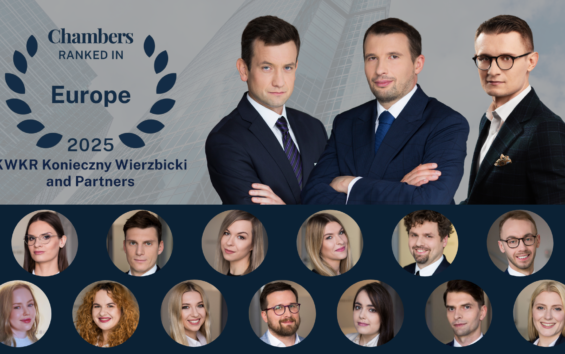
Rules related to the use of AI and Big Data (BDAI) by financial market players have been published. The text is an important contribution to the establishment of a European legal framework for the use of artificial intelligence in the Fintech industry.
On June 15, the German financial regulator BaFin published supervisory rules related to financial institutions’ use of algorithms in their decision-making processes. This is intended as a response to the increasing use of both Big Data and AI solutions. An additional objective is to promote the responsible use of advanced technologies by financial institutions in Germany. The study may also have an indirect impact on the shape of EU regulations. It will probably also become a source for creating rules and guidelines adopted by other financial market regulators.
Artificial intelligence as a combination of machine learning technology and Big Data
The principles published by BaFin do not refer only to issues related to artificial intelligence. They cover the broader context of applying AI and Big Data solutions as closely related technologies. According to BaFin, artificial intelligence solutions are based on a combination of machine learning and Big Data. BaFin, therefore, paid particular attention to the widely commented problem of the quality of data used to power AI-based solutions.
This is also an issue raised in the draft regulation on AI developed by the European Commission. The quality of results generated by artificial intelligence overwhelmingly depends on the quality of the data it uses. The emergence of a regulatory trend addressing both AI and Big Data in a single context is therefore not surprising. That’s because the existence of one is dependent on the other. And given how much we currently rely on this type of data, this phenomenon threatens our perception of data. In addition, we pass on this distorted image to our algorithms.
In the context of AI, we can expect increasing references also to the topics of data protection and cloud computing.
Definition of artificial intelligence
BaFin’s publication also draws attention to other problems that we have to face to regulate the use of AI. In particular, he raises the issue of distinguishing between the use of artificial intelligence and the use of only conventional statistics and “ordinary” algorithms. According to BaFin, today we are not able to create a fully precise definition of artificial intelligence. Nevertheless, we can specify certain features that allow us to distinguish AI-based technologies and methods. This also allows us to find those issues that should be subject to special regulations due to the risks involved. In this regard, Bafin distinguishes three key features:
- algorithm complexity – machine learning-based algorithms exhibit a much higher level of detail than traditional algorithms. This in turn makes them difficult for humans to understand,
- fast algorithm recalibration cycles – algorithms that, through self-learning and the use of massive data, can quickly recalibrate the model and solutions used. Consequently, the boundaries between algorithm calibration and validation become blurred,
- high degree of automation – in terms of non-standard processes allowing the algorithm to make quick decisions on a large scale
The EU legislator also faces the same problem. The issue of a general definition – interpreted in different ways – of artificial intelligence raises many emotions and controversies. It should be noted that the explanation presented by Bafin is more complex and narrower than the one presented by the European Commission.
Traditional algorithms vs. artificial intelligence
In BaFin’s view, the distinction between traditional algorithms and artificial intelligence algorithms does not just come down to an assessment of the techniques used (in particular machine learning technology). It also requires an assessment of other features of the algorithm. In the case of the draft EU regulation, the mere use of machine learning technologies automatically qualifies a given solution as artificial intelligence.
It is not yet clear what definition of AI will be finally adopted by the EU legislator and supervisory authorities. However, regardless of its final shape, this issue will still raise many doubts and controversies. Creating a uniform definition of artificial intelligence for regulatory purposes is difficult, and there will likely be a fierce debate in this area. In particular, during the work on the EU AI regulation project.
A comprehensive risk-based approach to AI regulation
BaFin, to develop precise supervisory rules and guidelines, divided the decision-making process using an algorithm into two phases: development and application. And in this case, a similar approach to artificial intelligence is presented in the EU’s AI regulation proposal. The draft regulation also sees the use of artificial intelligence as a process. And this covers both the design phase of the solution, as well as its application and further supervision of its functioning.
BaFin’s study draws attention to the oft-raised issues of proportionality of supervisory actions taken, the technological neutrality of regulation, and the need to counteract inequalities that may be associated with the use of artificial intelligence. Again, these issues are more or less addressed in the EU’s draft AI regulation.
Further work of market regulators in the context of AI and Big Data and the impact of the BaFin study on the process of AI regulation in the European Union
These supervisory principles are intended to be only one element of the development of a legal and regulatory framework in Germany for the application of BDAI solutions in the financial sector. BaFin has already announced that he intends to publish another study in mid-July. This time it will focus on business models that require regulatory approval in the context of prudential supervision.
The supervisory principles issued by BaFin have no direct binding force for entities operating in other member states. Nevertheless, there is no doubt that they are a significant contribution to the discussion on future AI regulation of the financial industry. The above study is intended as a contribution to the joint work of European supervisors and the European Commission on the future regulation of AI within the European Union. The issues raised by the German supervision and the point of view presented provide valuable material for the discussion on the future shape of these regulations.
It can also be expected that other financial market regulators will be interested in issuing their guidelines or opinions on the use of BDAI technology. The BaFin Principles are therefore an inspiration. Thanks to the publication also other supervisory authorities of European countries (including the Polish Financial Supervision Authority) will look at the problem.
It should be reminded that the Polish Financial Supervision Authority has released a survey on AI in the financial sector. This is the first step towards the issuance by the PFSA of possible clarifications and rules for the use of AI/ML in the processes of financial institutions. Therefore, changes are to be expected. Perhaps in the future, also the Polish regulator will issue appropriate guidelines, opinions, or announcements on the use of AI technology (and possibly Big Data) by financial market entities.

